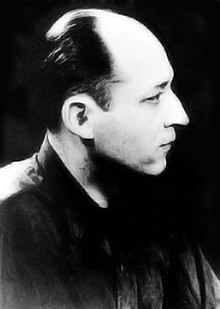Benjamin Péret
| Benjamin Péret | |
|---|---|
 |
|
| Born |
4 July 1899 Rezé, Loire-Atlantique, France |
| Died | 18 September 1959 (aged 60) Paris, Île-de-France, France |
| Nationality | French |
| Known for | Writing |
| Movement | Dada, Surrealism |
Benjamin Péret (4 July 1899 – 18 September 1959) was a French poet, Parisian Dadaist and a founder and central member of the French Surrealist movement with his avid use of Surrealist automatism.
Benjamin Péret was born in Rezé, France on 4 July 1899. He, as a child, acquired little education due to his dislike of school and he instead attended the Local Art School from 1912. He too, however, resigned soon after in 1913 due to his sheer lack of study and willingness to do so. Afterwards he spent a short period of time in a School of Industrial Design before enlisting in the French army's Cuirassiers during the First World War to avoid being jailed for defacing a local statue with paint. He saw action in the Balkans before being deployed to Salonica, Greece.
During a routine movement of his unit via train, he discovered a copy of the magazine Sic, sitting upon a bench on the station platform, which contained poetry by Apollinaire – sparking his love for poetry. Towards the end of the war, still in Greece, he suffered from an attack of Dysentery which led to his repatriation and deployment in Lorraine for the remainder of the war.
After the end of the war he joined the Dada movement and soon after, in 1921, he published Le Passager du transtlantique – his first book of poetry before he abandoned the Dada movement to follow André Breton and the emerging Surrealist movement, working alongside and influencing the Mexican writer Octavio Paz.
In the fall of 1924 he was the co-editor of the journal La Révolution surréaliste, becoming chief editor in 1925. And in 1928, before emigrating to Brazil in 1929 with his wife Elsie Houston, he published Le Grand Jeu. Two years later in 1931, a mere few months after the birth of his first son, Geyser, whilst living in Rio de Janeiro, he was arrested and expelled from Brazil on grounds of being a 'Communist Agitator' – having formed, with his brother-in-law Mario Pedrosa, the Brazilian Communist League which was based upon the ideas of Trotsky.
...
Wikipedia
